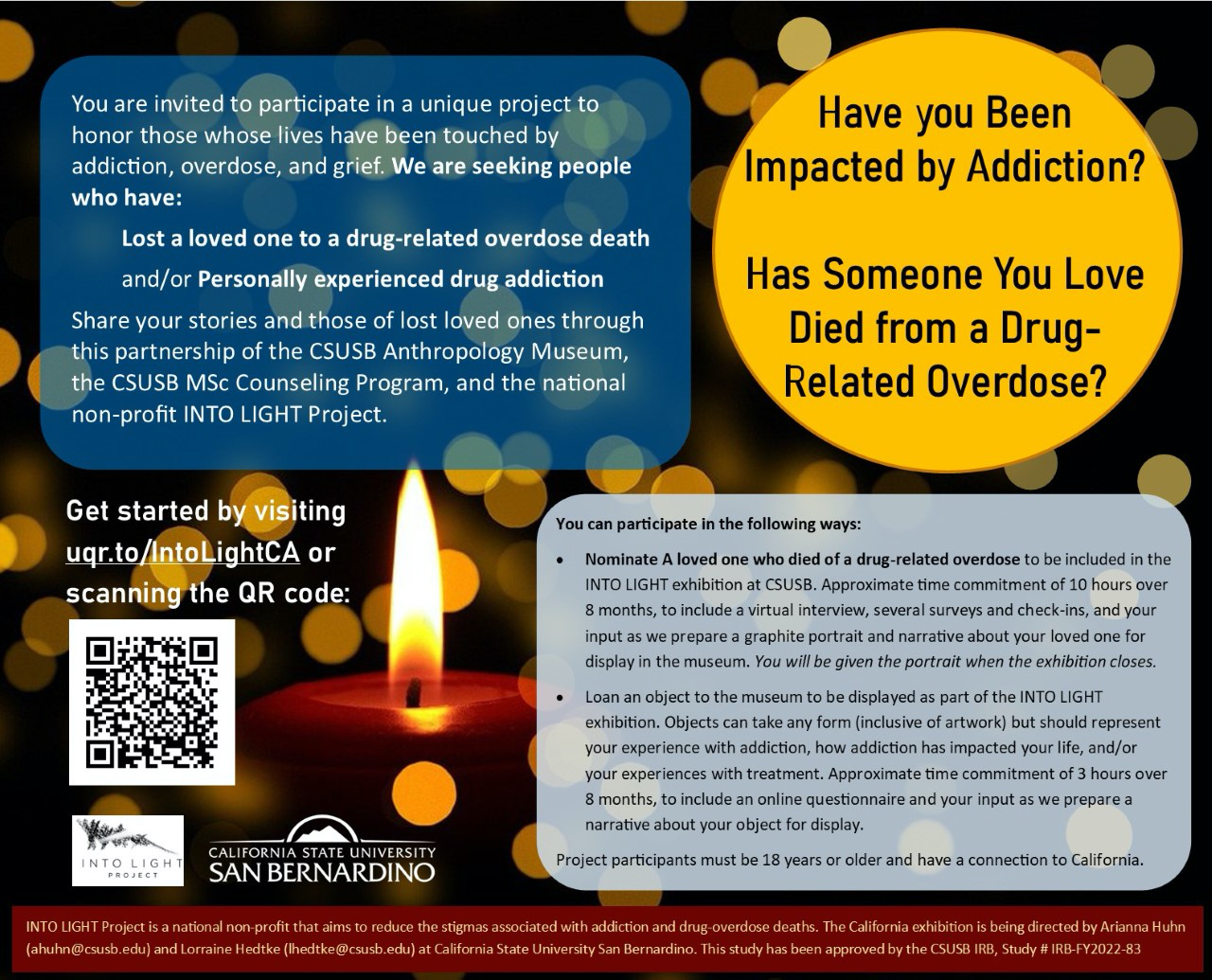Joe Gutierrez | CSUSB Office of Strategic Communication | (951) 236-4522 | joeg@csusb.edu

The Anthropology Museum at Cal State San Bernardino, along with the university’s master’s degree program in counseling, is seeking area residents to submit their stories for its next community-centered exhibit, a partnership with the national nonprofit INTO LIGHT Project, which aims to change the national conversation around addiction.
The exhibit, set to go on display in September, is part of a nationwide effort by INTO LIGHT Project, which through its exhibit participants, aims to have an exhibit in every state to raise awareness and reduce the stigma of Substance Use Disorder (SUD), which prevents the majority of those suffering from addiction to seek help.
Through the eyes of those who have lost loved ones to SUD, the project seeks to broaden discussions about addiction across the nation, and provide some relief for families who have lost loved ones to the overdose epidemic.
To nominate a loved one who lost their life to a drug-related overdose to be included in the California exhibit, family and friends can complete a brief online questionnaire. Individuals interested in loaning to the museum personal mementos that symbolize their own struggle with substance use disorder, or that of a loved one, can use the same form. Applicants must be at least 18 years old and have a connection to California.
Since 2019, Maryland, North Carolina, Ohio, Pennsylvania and Virginia have hosted INTO LIGHT Project exhibits; Florida is set to open its exhibit in March.
The California show, hosted by the CSUSB Anthropology Museum, will have two components. The first, like other INTO LIGHT exhibits, will feature stories and professionally prepared graphite portraits of individuals who lost their lives to a drug-related overdose. When the show closes, loved ones will be given the portraits as gifts.
The second component is similar to the Anthropology Museum’s previous community-centered exhibits, such as “Re|Collect: Memories of Childhood” – community members will be asked to loan to the museum for display items that represent their experiences with addiction. These items can take any form, inclusive of artwork.
“INTO LIGHT Project partners with museums to create unique exhibitions focused on substance use disorder in that state. Each project incorporates narratives and hand-drawn portraits of individuals whose lives were lost to a drug poisoning, or, overdose, in that state,” explained Arianna Huhn, director of the Anthropology Museum and associate professor of anthropology.
“The project is a great match for the mission of the CSUSB Anthropology Museum, which is to provide CSUSB students with hands-on experience in museum work, and to regularly prepare and host exhibitions that illustrate and interrogate the cultural contexts and meanings of community histories, events, identities, and behaviors, from the Inland Empire and afar,” Huhn said.
The California INTO LIGHT exhibit is also being prepared in collaboration with the university’s master’s in counseling program, which trains future counselors who will work in the community. Under the direction of Lorraine Hedtke, program coordinator of the MS in Counseling program and an international expert in the field of death and grief, the students will conduct interviews with families and individuals who have lost people due to drug overdose and death to gather stories about their lost loved ones for display in the museum. The stories collected will highlight the unique aspects of the personality and skills and interests of the person who died as a way to honor the loving relationship that transcends death.
The graduate students are particularly trained to speak to those who have died as a result of an overdose and addiction.
“The program prepares students to have conversations that bring forward the most loving stories about a person whose died that can ease the pain of grief and assist in making sense out of death that feels taboo or traumatic,” Hedtke said. “Students will take this practical experience into their future work counseling those who are suffering and bereaved.”
A local artist, Elizabeth Jones of Pomona, will assist with the graphite portraits that are drawn based on photographs of the individuals nominated for the show. Theresa Clower, founder of INTO LIGHT Project, said the pencil drawings serve as an intentional reminder that we are all made up of black and white, and every shade in between.
“No one,” she said, “should be defined by their darkest moments alone.” In other words, the identity of those with SUD is more than addiction, and the exhibition seeks to present the lives of those lost in a manner that helps others to see the fullness of the lives lost to SUD.
Motivated by the death of her son, Devin, to an overdose of fentanyl in 2018, Clower took up portrait work as a way of working through her grief. After completing Devin’s portrait, she was inspired to find others who lived and died like her son and to show the extent of the drug epidemic through exhibits involving each state. She aspired to draw their portraits, tell their stories, and start a dialogue around the disease.
INTO LIGHT Project broadly seeks to:
- Put a human face on the disease of addiction through hand-drawn portraits and written narratives;
- Change the conversation about drug addiction to help erase the stigma and shame so those with the disease will seek the quality care they need and deserve;
- Educate the public about drug addiction as a disease; and
- Organize exhibitions representing each of the 50 states.
The number of anticipated participants for the California show – 45 persons – is symbolic. Clower explained: “We always choose the number intentionally, so that people will ask about it. Originally it was 41 – the number of individuals who lose their lives to drug poisoning every four hours in the United States.” This reflects statistics from the year 2020, in which 91,799 drug overdose deaths occurred. “It used to be every five hours.” In 2020, there were 5,502 overdose deaths in California. This means that 45 persons were lost every three days in the state of California.
To learn more about the exhibit, contact the California INTO LIGHT Project directors Arianna Huhn (ahuhn@csusb.edu) and Lorraine Hedtke (lhedke@csusb.edu). For more information visit the INTO LIGHT Project website or email founder Theresa Clower at tclower@intolightproject.org.
